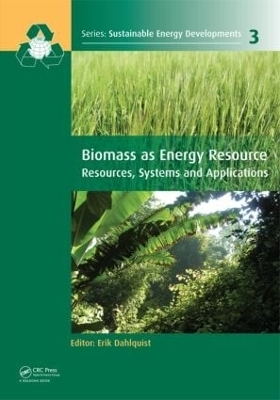
Biomass as Energy Source
CRC Press (Verlag)
978-0-415-62087-1 (ISBN)
This book discusses the biomass resources available and aspects like efficient energy use. One way of using energy efficiently is to use waste biomass or cellulosic materials in biorefineries, where production of fibers and products from fibers is combined with production of most chemicals we need in our daily life. Such products include clothes, soap, perfume, medicines etc. Conventional pulp and paper applications, bio-fuel for vehicles and even fuel for aviation as well as heat and power production are covered. The problem with biomass is not availability, but the difficulty to use the resources efficiently without harming the long-term productivity. This book covers all types of resources on a global scale, making it unique. Many researchers from all over the world have contributed to give a good coverage of all the different international perspectives.
This book will provide facts and inspiration to professionals, engineers, researchers, and students as well as to those working for various authorities and organizations.
Erik Dahlquist is Professor in Energy Technology at Malardalen University (MDU) in Västerås, Sweden focussing on biomass utilization and process efficiency improvements. He started working at ASEA Research in 1975 as engineer in analytical chemistry related to nuclear power, troubleshooting of electrical equipment and manufacturing processes. In 1982 he started with energy technology within the pulp and paper industry and participated in the development of year-around fuel production from peat. In 1984 ASEA started a company ASEA Oil and Gas with a focus on off-shore production systems. One area was waste water treatment and separation of oil and water. He then became technical project manager for development of a Cross Flow Membrane filter. This led to the formation of ABB Membrane Filtration. The filter is now a commercial product at Finnish Metso Oy under the name Optifilter. As part of this development work he started as an industrial PhD student at KTH and received his doctorate in 1991. In 1989 he became project leader for ABB’s Black Liquor Gasification project, which resulted in a number of patents. From 1992 to 1995 he was department manager for Combustion and Process Industry Technology at ABB Corporate Research. He was also at that time member of the board of directors for ABB Corporate Research in Sweden. From January 1996 to 2002 he was General Manager for the Product Responsible Unit “PulpApplications”worldwide within ABB Automation Systems. The product area was Advanced Control, Diagnostics, Optimization, Process Simulation and Special Sensors within the pulp and paper industry. During 1997–2000 he was part time adjunct professor at KTH and from 2000 to 2002 part time professor at MDU. He has been responsible for research in Environmental, Energy and Resource Optimization at MDU since 2000. During 2001–2007 he was first deputy dean and later dean of the faculty of Natural Science and Technology. He has been a member of the board of the Swedish Thermal Engineering Research Institute division for Process Control systems since 1999. He received the ABB Corporate Research Award 1989. He has been a member of the board of SIMS (Scandinavian Simulation and Modeling Society) since 2003 and deputy member of the board of Eurosim since 2009. He has been a member of the editorial board of the Journal of Applied Energy, Elsevier since 2007. He is also a member of the Swedish Royal Academy of Engineering (IVA) since 2011. He has 21 (different) patents and approximately 170 scientific publications in refereed journals or conference proceedings with referee procedure to his name. He has published seven books, either as editor or author.
Introduction
I - Biomass resources;
1. Introduction and context
2. Chemical composition of biomass
3. Characterization of biomass using instruments - Measurement of forest and crop residues
4. Bioenergy in Brazil - from traditional to modern systems
5. Biomass in different biotopes - an extensive resource
6. Organic waste as a biomass resource
II - Systems utilizing biomass – system optimization
7. System aspects of biomass use in complex applications: biorefineries for production of heat, electric power and chemicals
8. Biorefineries using wood for production of specialty cellulose fibers, lignosulfonates, vanillin, bioethanol and biogas
- the Borregaard Sarpsborg example
9. Biorefineries using crops for production of ethanol, biogas and chemicals – a large-scale demonstration in Nanyang, Henan province, China of the bio-ethanol industry under Tianguan recycling economic mode
10. Bioenergy polygeneration, carbon capture and storage related to the pulp and paper industry and power plants
11. Biofuels and green aviation
12. Pulp and paper industry – trends for the future
13. Biorefineries using waste - production of energy and chemicals form biomass by micro-organisms
14. Concluding remarks and perspectives on the future of energy systems using biomass
Subject index
| Reihe/Serie | Sustainable Energy Developments |
|---|---|
| Verlagsort | London |
| Sprache | englisch |
| Maße | 174 x 246 mm |
| Gewicht | 793 g |
| Themenwelt | Naturwissenschaften ► Biologie ► Ökologie / Naturschutz |
| Naturwissenschaften ► Chemie ► Technische Chemie | |
| Technik ► Bauwesen | |
| Technik ► Elektrotechnik / Energietechnik | |
| Technik ► Umwelttechnik / Biotechnologie | |
| ISBN-10 | 0-415-62087-2 / 0415620872 |
| ISBN-13 | 978-0-415-62087-1 / 9780415620871 |
| Zustand | Neuware |
| Informationen gemäß Produktsicherheitsverordnung (GPSR) | |
| Haben Sie eine Frage zum Produkt? |
aus dem Bereich


